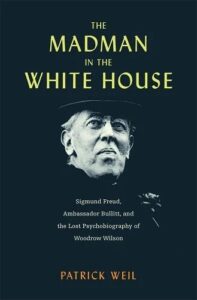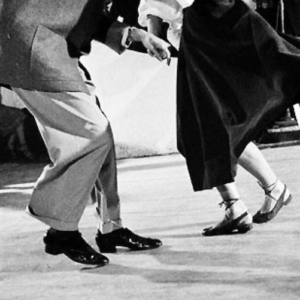The President and the Psychoanalyst: What Sigmund Freud Saw in Woodrow Wilson
From Patrick Weil's Cundill Prize-Nominated The Madman in the White House
For most participants of the Paris Peace Conference, including most of the Americans present, there was no question that Woodrow Wilson bore primary responsibility for the failed ratification of the Treaty of Versailles and its consequences for the world. Such has been the verdict of scholars as well. In Woodrow Wilson and the Great Betrayal (1945), historian Thomas A. Bailey summed up Wilson as “the supreme paradox”: “he who had forced the Allies to write the League into the Treaty, unwrote it. He who had done more than any other man to make the covenant, unmade it—at least so far as America was concerned. And by his action, he contributed powerfully to the ultimate undoing of the League, and with it the high hopes of himself and mankind for an organization to prevent World War II.”
The cause of Wilson’s fatal stubbornness in autumn 1919 will forever remain a matter for interpretation. Senator Gilbert Hitchcock thought Wilson’s stroke on October 2 led to his obstinacy and the treaty’s failure. “I shall always believe ratification would have been possible if Wilson’s health would not have given way,” Hitchcock said. But this view was in the minority. Many were those who attributed Wilson’s behavior to psychological causes: John Maynard Keynes, Henry Cabot Lodge, Colonel Edward House, Winston Churchill, Robert Lansing, William C. Bullitt, and Sigmund Freud.
He had created the illusion of a just and perpetual peace and then nurtured disappointment by being unable to realize it.Bullitt and Freud’s biography of Woodrow Wilson was the first attempt to apply psychoanalytic theory to a political leader and, as such, brought about interpretive innovations. The book was not one of Freud’s archetypal works, with his incomparable mix of insight, precision, and literary elegance. Instead, the Wilson book was sometimes monotonous, mechanical, and quite repetitive. Often it was vindictive. And I believe their interpretation goes too far: Freud and Bullitt saw Wilson’s neurosis as ever-present, explaining everything in his life. My own view is that Wilson’s neurosis limited his rational judgment at key moments, with profound reverberations in world history, but he was not a constant slave to his phobias and fixations. Even so, Bullitt and Wilson accomplished something highly original in drawing a psychological portrait of a world leader on the basis of inner-circle interviews and archival documents.
The authors were insisting on Wilson’s responsibility for the tragedy that was unfolding in real-time. He had created the illusion of a just and perpetual peace and then nurtured disappointment by being unable to realize it. When the treaty he negotiated came to contain a system of collective security, he was the man responsible for its nonratification. He armed the peoples of the defeated states with anger before disarming his allies. As Freud wrote in his introduction, “When, like Wilson, a man achieves almost the exact opposite of that which he wished to accomplish…when a pretension to free the world from evil ends only in a new proof of the danger of a fanatic to the commonweal, then it is not to be marveled at that a distrust is aroused in the observer which makes sympathy impossible.”
Alongside its pioneering contributions, the book represented a rare overt political gesture on Freud’s part. From 1930 to 1932, as Bullitt and Freud were making progress, the Nazis were rising to power; Hitler would be chancellor within months of the manuscript’s completion. Had the book been published in 1932, Freud and Bullitt would have been attacked for it. But at least Freud—old and sick, yet still the father of psychoanalysis—would have been able to write, speak, and give interviews. He had the scientific authority to explain how and why Wilson’s neurosis had been responsible for the failure of the treaty. And he would have been seconded by Bullitt, a courageous American with the knowledge and access to speak candidly about the former president, what he had done in Paris, and the impact he had had on world peace.
____________________________________
The Madman in the White House: Sigmund Freud, Ambassador Bullitt, and the Lost Psychobiography of Woodrow Wilson by Patrick Weil has been shortlisted for the 2020 Cundill History Prize.
____________________________________
But that is not what happened, and in 1966 there was no hope of political impact. By this point Wilson had been sanctified as the martyr of Versailles, whose ardent wish to foster peace through the League of Nations had been undone by isolationists. The failure of ratification was considered a product of ideological difference alone. Thus in a December 1966 Look article, former CIA director Allen Dulles denounced the Freud-Bullitt book as a study “bred in bitterness.” He added, “I would hope that this book would not initiate a series of biographies based on posthumous psychiatric studies of our departed great idealists.”
But Frank C. Waldrop, at least, was not so sure. A noted author and newspaper editor, Waldrop thought Freud and Bullitt’s book demonstrated
how pallid and incomplete historical and biographical writing must be in avoidance of the evidence which counts in the measure of a public personage…State Papers, however elegant, are no final measure of a President’s influence on the lives of others. There are also his secrets laid on his soul long before he thought he could call it his own, and which he, like all other men, must seek to endure without acknowledging them to exist. They matter. The Freud-Bullitt study…is an attempt to get at those secrets in the case of one man, insofar as evidence is available…It was not Wilson’s idealism, but those springs in his nature which drove his pursuits, that weighted most in the world while he lived, and which weighted most, even yet. Not protestations, but acts, are what we must consider in choosing among those who would lead us, whether a Wilson, a Hitler, a Stalin, or a Mao.
Freud and Bullitt wanted to warn their readers and all people that history and the fate of humanity are not only the products of ideas or structures or the hard material facts. Rather, they are also the consequences of individual action. Dictators are easy to read. Democratic leaders are more difficult to decipher. However, they can be just as unbalanced as dictators and can play a truly destructive role in our history. Today the question posed by Freud and Bullitt is as acute as it has ever been. By what means shall democracies prevent those who cannot be trusted with power from obtaining it—and using it to the detriment of their constituents, the wider world order, and democracy itself? The time has come to reopen this conversation.
__________________________________

From The Madman in the White House: Sigmund Freud, Ambassador Bullitt, and the Lost Psychobiography of Woodrow Wilson by Patrick Weil. Copyright © 2023. Available from Harvard University Press.




















